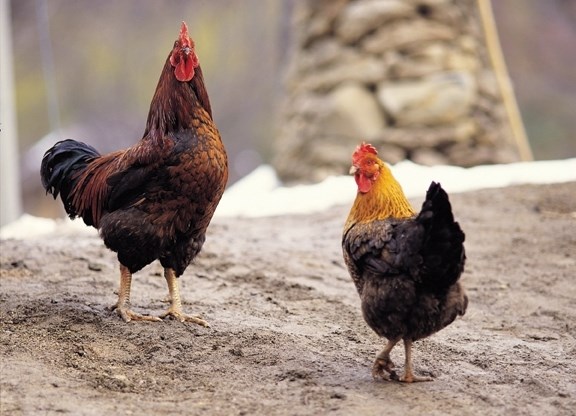Council was not prepared to give the carte blanche cluck on a hen pilot, but did unanimously concede to direct administration to re-draft a pilot project to be voted on at a later date – and likely by a new council.
For proponents of urban egg-layers, it was a win.
“I’m looking forward to the upcoming election and working with a new council towards a pilot project with reasonable parameters,” said Jennifer Walden, founder of the Cochrane chapter of the Canadian Liberated Urban Chicken Klub (CLUCK). She said despite being a community that prides itself on its sustainability merits, Cochrane is one of the last in the region to board the bus.
She emphasized that the time is now for the community to speak up and show support for backyard feathered fowl by flooding councillors’ inboxes – with suggested parameters such as three to six hens per permitted household; permits issued for around one in 1,500 households; and coop building height and care regulations.
While all councillors continue to “sit on the fence” about whether a hen pilot could work in Cochrane, they regarded Walden’s presentation to council this week as containing enough evidence to warrant further exploration and that a future pilot would position residents to decide.
Coun. Morgan Nagel thought it would have made more sense to pass the pilot this week, but other councillors indicated they were not compelled enough to give the green light and would rather see a revised version of a draft pilot to better address some of their concerns.
Nagel also questioned whether council was looking to “over-regulate” something that appeared to be of little concern in other communities – joking that there was no need for “the big department of chicken management.”
Mayor Ivan Brooker expressed concern that he had received “a ton of emails” from those in the community against a hen pilot versus no contact from supporters.
“I would be prepared to change my mind today, but I would be very curious as to the feedback we would get when this hits the papers again.”
Couns. Gaynor Levisky, Tara McFadden and Ross Watson also advised they had received negative reaction to a proposed pilot.
Walden’s presentation proposing a one-year hen pilot last November resulted in a unanimous 6-0 naysay by council – highlighting concerns such as increased predation due to Cochrane’s location in a wildlife corridor; noise and odour of backyard hens; cost effectiveness of the backyard venture; and general interest.
Her return to Monday night council was a mission to set the record straight and deliver the facts from her extensive research on the success of hen pilot and bylaws in comparable wildlife corridor communities such as Black Diamond, High River, Okotoks and Turner Valley.
According to Walden, the only complaint she could find was one report of someone with backyard hens in Turner Valley who wasn’t registered in the program; the individual registered and no further complaints were noted.
Walden said all her talks with fish and wildlife, bylaw and town administrative officers resulted in the consensus that no increased predation resulted from urban hens and that the fowl, thanks to proper coop care, were no more likely to attractant wildlife than households felines or canines.
She confirmed that she has 26 confirmed potential participants – more than the recommended number of pilot licences.
Watson disagreed with Walden and reiterated his previous concerns with increased predation, adding that he would like to see administration address certain areas in the community that would not be suitable for hens due to heavy wildlife traffic.
CLUCK Cochrane can be reached through Facebook.




